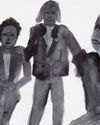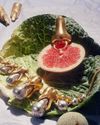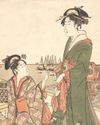
Most who have followed Singapore’s fashion industry through the years would point to the ’80s and ’90s as the heyday for Singaporean models — when women such as Ethel Fong, Hanis Hussey and Huda Ali blossomed on runways and campaigns for legacy fashion houses, carving out a place for our tiny city on the fashion map.
An industry still dominated by Western models made for Western-dominated audiences meant that for brands, engaging models from Asia came with significant financial risks. But cultural shifts of the fashion gaze, which has always looked to novelty and exoticism, might have helped alleviate those concerns. The fact that all this happened before the digital age perhaps enhanced the appeal of these pioneering Asian supermodels.
Such success can perhaps be attributed to unprecedented growth in the Singapore economy during that period, when the nation rose to prominence in global markets as one of the Four Asian Tigers. In 1997, Fashion Connections Singapore (an event that became Singapore Fashion Week in 2001) led plans to make Singapore a fashion hub — “a marketplace for the 400 million people in the countries of the Association of Southeast Asian Nations,” wrote Suzy Menkes for The New York Times. Stephen Lee, the chairman of the Singapore Trade Development Board at the time, described the three-day event — which included a trade show and a designer contest among Southeast Asian countries — as “a gateway to the burgeoning Asian market.” During the same period, famous French upmarket departmental stores like Printemps and Galeries Lafayette made brief forays into the Singapore fashion market.
この記事は T Singapore: The New York Times Style Magazine の August 2020 版に掲載されています。
7 日間の Magzter GOLD 無料トライアルを開始して、何千もの厳選されたプレミアム ストーリー、9,000 以上の雑誌や新聞にアクセスしてください。
すでに購読者です ? サインイン
この記事は T Singapore: The New York Times Style Magazine の August 2020 版に掲載されています。
7 日間の Magzter GOLD 無料トライアルを開始して、何千もの厳選されたプレミアム ストーリー、9,000 以上の雑誌や新聞にアクセスしてください。
すでに購読者です? サインイン

Look At Us
As public memorials face a public reckoning, there’s still too little thought paid to how women are represented — as bodies and as selves.

Two New Jewellery Collections Find Their Inspiration In The Human Anatomy
Two new jewellery collections find their inspiration in the human anatomy.

She For She
We speak to three women in Singapore who are trying to improve the lives of women — and all other gender identities — through their work.
Over The Rainbow
How the bright colours and lively prints created by illustrator Donald Robertson brought the latest Weekend Max Mara Flutterflies capsule collection to life.

What Is Love?
The artist Hank Willis Thomas discusses his partnership with the Japanese fashion label Sacai and the idea of fashion in the context of the art world.

The Luxury Hotel For New Mums
Singapore’s first luxury confinement facility, Kai Suites, aims to provide much more than plush beds and 24-hour infant care: It wants to help mothers with their mental and emotional wellbeing as well.

Who Gets To Eat?
As recent food movements have focused on buying local or organic, a deeper and different conversation is happening among America’s food activists: one that demands not just better meals for everyone but a dismantling of the structures that have failed to nourish us all along.

Reimagining The Future Of Fashion
What do women want from their clothes and accessories, and does luxury still have a place in this post-pandemic era? The iconic designer Alber Elbaz thinks he has the answers with his new label, AZ Factory.

A Holiday At Home
Once seen as the less exciting alternative to an exotic destination holiday, the staycation takes on new importance.
All Dressed Up, Nowhere To Go
Chinese supermodel He Sui talks about the unseen pressures of being an international star, being a trailblazer for East Asian models in the fashion world, and why, at the end of the day, she is content with being known as just a regular girl from Wenzhou.